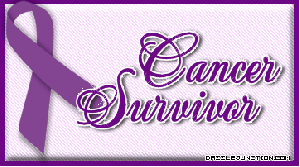Sunday, June 2, 2013
National Cancer Survivors Day: Guest Post By Melanie Bowen
I’m back from vacation, and I’ll be writing a recap of my trip in the next several days. While I was away, I received an email asking if I allow guest posts on my blog. I have never done anything like that, but I welcome the opportunity to share other people’s writing. Melanie Bowen has written an excellent article about the benefits of exercise after being diagnosed with cancer. She also informed me that today, June 2, is National Cancer Survivors Day (going strong for 26 years).
Here is Melanie’s article. Enjoy!
Exercise and Your Life Beyond Cancer
Ask anyone who has battled cancer, and they will say it is a life-changing experience. If you are currently fighting the disease, you know they are right. Because of the advances in medical research and technology, you know something else about cancer: there is life beyond it.
If you are recovering from the effects of surgery or cancer therapy, a cancer fitness program can help the recovery process. Though it may seem counterintuitive, exercise can relieve your cancer-related fatigue, boost your energy and help you recover your strength. It can also help you regain control of your life after going through the cancer trauma.
Most fitness experts recommend getting 150 minutes of exercise each week. Most people can accomplish this in five 30-minute sessions, but you can break it down into shorter segments if needed. Some exercises are better than others, depending on your type and stage of cancer.
If you would like to integrate exercise into your cancer treatment plan, talk to your doctor about it. He or she can recommend certain exercises for your particular needs. It is important to exercise at a level that is appropriate for your recovery stage. To give you an idea of what may or may not be appropriate, here are a few examples.
Light Exercises
Breathing exercises are a great example of a light exercise. Light exercises are meant for patients who are receiving aggressive treatments or who are battling serious cancer. They are simple exercises for people who need to take it slow and easy. If you have mesothelioma or any lung-related cancers, you know how hard it is to breathe, especially while you are active. Traditional exercises are too hard to perform right now. Breathing exercises, however, can be helpful to your recovery.
By learning how to elongate your breathing and slow it down, you become aware of each inhale and exhale of breath. This can help you take in more oxygen and improve your respiratory function. As your health improves, you can slowly add physical activity to your regimen.
Moderate Exercises
Moderate exercises are appropriate for those who are recovering from cancer treatment. They are intense enough to cause you to break out in a light sweat after a few minutes of exercise. However, they will not take away your breath and you can still carry on a conversation with an exercise partner.
Yoga is a good example of a moderate exercise for cancer fitness. Contrary to common belief, yoga is not a religious practice but a philosophy. The mind-body aspects make it particularly beneficial for cancer patients. Yoga is a great stress reliever, and many cancer treatment centers offer classes for patients in recovery. An MD Anderson Cancer Center study showed benefits beyond improving fatigue. If you want to feel better, sleep better and improve your recovery, consider implementing yoga into your fitness routine.
Advanced Exercises
Advanced exercises are meant for cancer patients who are in advanced stages of recovery. If this describes you, your strength and physical conditioning can improve with vigorous activity. Expect to breath deeply and work up a sweat.
High-intensity aerobics are ideal for this level of cancer fitness, but consult with your physician before you take an aerobics class. This type of exercise requires constant movement and a lot of energy. Aerobics can improve fatigue after cancer treatment. If radiation or chemotherapy has sapped your energy, aerobic activity can help you regain your vigor and strength. Too much rest can lead to more tiredness and less function.
Exercise is not a cure-all for cancer, and it cannot treat the disease. However, it is safe for almost all cancer patients and it can help your recovery in many ways. Talk to your doctor first to have a better gauge as to what exercises are most appropriate for your fight again and life beyond cancer.
Subscribe to:
Post Comments (Atom)




[…] National Cancer Survivors Day: Guest Post By Melanie Bowen […]
ReplyDelete